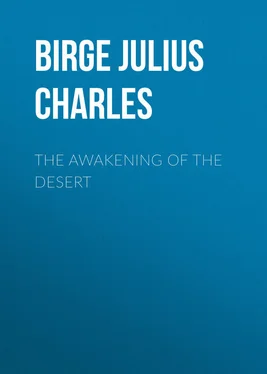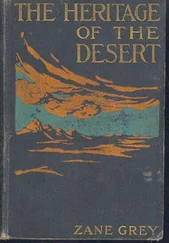Julius Birge - The Awakening of the Desert
Здесь есть возможность читать онлайн «Julius Birge - The Awakening of the Desert» — ознакомительный отрывок электронной книги совершенно бесплатно, а после прочтения отрывка купить полную версию. В некоторых случаях можно слушать аудио, скачать через торрент в формате fb2 и присутствует краткое содержание. Жанр: foreign_language, foreign_antique, foreign_prose, на английском языке. Описание произведения, (предисловие) а так же отзывы посетителей доступны на портале библиотеки ЛибКат.
- Название:The Awakening of the Desert
- Автор:
- Жанр:
- Год:неизвестен
- ISBN:нет данных
- Рейтинг книги:5 / 5. Голосов: 1
-
Избранное:Добавить в избранное
- Отзывы:
-
Ваша оценка:
- 100
- 1
- 2
- 3
- 4
- 5
The Awakening of the Desert: краткое содержание, описание и аннотация
Предлагаем к чтению аннотацию, описание, краткое содержание или предисловие (зависит от того, что написал сам автор книги «The Awakening of the Desert»). Если вы не нашли необходимую информацию о книге — напишите в комментариях, мы постараемся отыскать её.
The Awakening of the Desert — читать онлайн ознакомительный отрывок
Ниже представлен текст книги, разбитый по страницам. Система сохранения места последней прочитанной страницы, позволяет с удобством читать онлайн бесплатно книгу «The Awakening of the Desert», без необходимости каждый раз заново искать на чём Вы остановились. Поставьте закладку, и сможете в любой момент перейти на страницу, на которой закончили чтение.
Интервал:
Закладка:
As the milk was to be served freely to all the boys for breakfast, and as we were desirous that all questions of justice and equity should be fairly settled before any property should be appropriated to our use which might have been unlawfully acquired, the jury, after prayerful consideration decided that as the food taken by said cow to produce said milk was public property, the milk also was the property of the public. We, therefore, used the milk in our coffee for breakfast. It was also the last obtained by the men for many months.
At this juncture I was to be sent upon a mission. There had been transported in the Captain's wagon a little more than $8,000.00 in currency to be used in the purchase of supplies. Whitmore was anxious that this currency, which was quite a large sum for that day, should be deposited in some bank in Nebraska City. Improvising a belt in which the money was placed, I started out alone for that town, and soon encountered heavy storms, which delayed progress. On one day in which I made a continuous ride of seventy-eight miles, one stretch of twenty-four miles was passed along which no house was visible. This indicated the tapering out of civilization and the proximity of the western limit of population in that territory.
On the 22d of May I crossed the Missouri River by a ferry, after fording a long stretch of flooded bottom lands to the landing, five days after leaving our train, and reached Nebraska City, then an outfitting point for transcontinental travel.
CHAPTER IV
A River Town of the Day
FROM the western boundary of the state that bears its name, the attenuated channel of the Missouri River stretched itself far out into the unsettled Northwest, projecting its long antennae-like tributaries into the distant mountains, where year after year the fur traders awaited the annual arrival of the small river steamers, which in one trip each summer brought thither supplies from St. Louis and returned with rich cargoes of furs and peltries. On the western bank of that turbid, fickle stream were half a dozen towns, known chiefly as out-fitting places, which owed their existence to the river transportation from St. Louis, whereby supplies consigned to the mountains, or to the Pacific Coast, could be carried hundreds of miles further west and nearer to the mining districts and the ocean than by any other economical mode of transit. These towns had, therefore, become the base of operations for commerce and travel between the East and the far West, and so remained until the transcontinental railroads spanned the wilderness beyond.
Nebraska City was a fair type of those singular towns, which possibly have no counterpart at the present time. Like many western settlements, Nebraska City was christened a city when in its cradle, possibly because of the prevailing optimism of all western town-site boomers, who would make their town a city at least in name, with the hope that in time it would become a city in fact. The visitor to one of those towns at the present day is sure to be impressed with the remarkable metamorphosis wrought in five decades, if he stops to recall the hurly-burly and bustle of ante-railroad days when the great wagon trains were preparing for their spring migration.
It was at noon on the day of my arrival in Nebraska City when I debarked from the ferryboat and rode my horse up the one street of the embryo city until I discovered the primitive caravansary known as the Seymour House, which provided entertainment not only for man and beast but incidentally also for various other living creatures. The house seemed to be crowded, but with the suave assurance characteristic of successful hotel managers, the host encouraged me to cherish the hope that I might be provided with a bed at night, which would be assigned me later. After taking a hasty meal, being as yet undespoiled of the funds I had transported, I entered a bank, and with little knowledge concerning its solvency, gladly relieved myself of the burden of currency which I had borne for many days and nights. Then I strolled out upon the busy highway to see the town.
Rain had been falling intermittently for several days, leaving portions of the roadway covered with a thick solution of clay, but there were sidewalks which the numerous pedestrians followed. A panoramic view of the streets could not fail to remind one of the country fairs in olden times. Huge covered wagons, drawn by four or five yoke of oxen, or as many mules, moved slowly up and down that thoroughfare. Mingled with these were wagons of more moderate size, loaded with household goods, the property of emigrants. I learned that the greater number of these were taking on supplies for their western journey. Many men, some mounted upon horses and others upon mules, were riding hurriedly up and down the street, as if speeding upon some important mission. All these riders seemed to have adopted a free and easy style of horsemanship entirely unlike that which is religiously taught by riding masters and practiced by gentlemen in our city parks. Their dress was invariably some rough garb peculiar to the West, consisting in part of a soft hat, a flannel shirt, and "pants" tucked tightly into long-legged boots, which were generally worn in those days. To these were added the indispensable leather belt, from which in many cases a revolver hung suspended. Men of the same type thronged the sidewalks; many of them with spurs rattling at their heels were young, lusty-looking fellows, evidently abounding in vigor and enthusiasm.
I conversed with many of them, and learned that the greater number were young farmers or villagers from the western and southern states. Some of them were wearing the uniform of the Northern or the Southern army. Assembled in and around the wide-open saloons there were also coteries of men whose actions and words indicated that they were quite at home in the worst life of the frontier. Hardly one of these men then upon the streets, as far as I could discover, was a resident of the city; all seemed to be planning to join some train bound for the West. Such were some of the factors destined to waken into life the slumbering resources of the broad, undeveloped regions beyond the Missouri.
Wandering further up the street, my steps were attracted toward a band of Pawnee Indians, who had entered the town, and, standing in a compact group, were gazing with silent, stolid solemnity upon the busy scene. As was the custom with that tribe, their stiff black hair was cut so as to leave a crest standing erect over their heads. Their blankets, wrapped tightly around their bodies, partly exposed their bare limbs and moccasined feet, their primitive bows and their quivers of arrows. They had not yet degenerated into the mongrel caricatures of the noble red man that are often seen in later days, garbed in old straw hats and a few castaway articles of the white man's dress, combined with paint and feathers; but they stood there as strong representatives of the last generation of one of the proudest and most warlike tribes of America, the most uncompromising enemy of the Sioux, and as yet apparently unaffected by contact with civilization.
Led by a natural desire to learn what were the thoughts then uppermost in their minds, I cordially addressed them with the formal salutation "How," a word almost universally understood and used in friendly greeting to Indians of any tribe. A guttural "How" was uttered in return, but all further efforts to awaken their interest were fruitless. I was not surprised to discover that no language at my command could convey to them a single idea. The subject of their revery, therefore, remains a secret.
I well knew, however, that we were then standing on a part of their former hunting grounds and that lodges of their tribe had often stood on that very bluff. Had I seen my home of many years thus occupied by unwelcome invaders, I, too, might have spurned any greeting from a member of the encroaching race. Those Pawnees certainly heard their doom in the din and rattle upon that street where the busy white man was arming to go forward through the Indian's country. They soon turned their backs on the scene and I saw them file again slowly westward toward the setting sun.
Читать дальшеИнтервал:
Закладка:
Похожие книги на «The Awakening of the Desert»
Представляем Вашему вниманию похожие книги на «The Awakening of the Desert» списком для выбора. Мы отобрали схожую по названию и смыслу литературу в надежде предоставить читателям больше вариантов отыскать новые, интересные, ещё непрочитанные произведения.
Обсуждение, отзывы о книге «The Awakening of the Desert» и просто собственные мнения читателей. Оставьте ваши комментарии, напишите, что Вы думаете о произведении, его смысле или главных героях. Укажите что конкретно понравилось, а что нет, и почему Вы так считаете.











